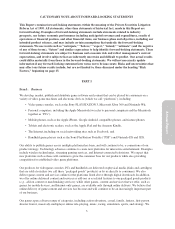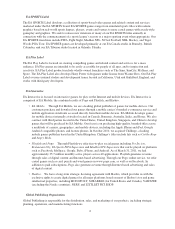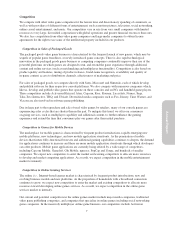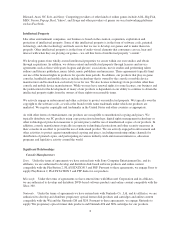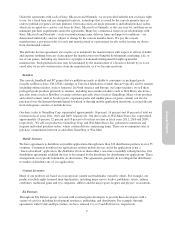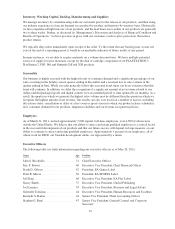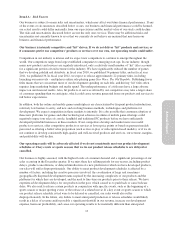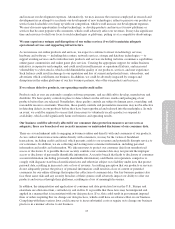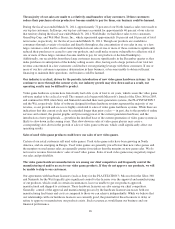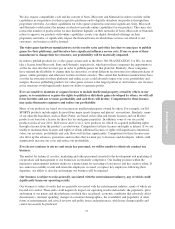Electronic Arts 2011 Annual Report Download - page 83
Download and view the complete annual report
Please find page 83 of the 2011 Electronic Arts annual report below. You can navigate through the pages in the report by either clicking on the pages listed below, or by using the keyword search tool below to find specific information within the annual report.
Annual Report
Competition
We compete with other video game companies for the leisure time and discretionary spending of consumers, as
well as with providers of different forms of entertainment, such as motion pictures, television, social networking,
online casual entertainment, and music. Our competitors vary in size from very small companies with limited
resources to very large, diversified corporations with global operations and greater financial resources than ours.
We also face competition from other video game companies and large media companies to obtain license
agreements for the right to use some of the intellectual property included in our products.
Competition in Sales of Packaged Goods
The packaged goods video game business is characterized by the frequent launch of new games, which may be
sequels of popular game franchises, or newly introduced game concepts. There is also rapid technological
innovation in the packaged goods game business as competing companies continually improve their use of the
powerful platforms on which games are designed to run, and extend the game experience through additional
content and online services (such as matchmaking and multiplayer functionality). Competition is also based on
product quality and features, timing of product releases, brand-name recognition, availability and quality of
in-game content, access to distribution channels, effectiveness of marketing and price.
For sales of packaged goods, we compete directly with Sony, Microsoft and Nintendo, each of which develop
and publish software for their respective console platforms. We also compete with numerous companies which,
like us, develop and publish video games that operate on these consoles and on PCs and handheld game players.
These competitors include Activision Blizzard, Atari, Capcom, Koei, Konami, LucasArts, Namco, Sega,
Take-Two Interactive, THQ, and Ubisoft. Diversified media companies such as Fox, Disney, Time Warner, and
Viacom are also involved in software game publishing.
Due in large part to the repurchase and sale of used video games by retailers, many of our console games are
experiencing sales cycles that are shorter than in the past. To mitigate this trend, we offer our consumers
on-going services, such as multiplayer capability and additional content, to further enhance the gaming
experience and extend the time that consumers play our games after their initial purchase.
Competition in Games for Mobile Devices
The marketplace for mobile games is characterized by frequent product introductions, rapidly emerging new
mobile platforms, new technologies, and new mobile application storefronts. As the penetration of mobile
devices that feature fully-functional browsers and additional gaming capabilities continues to deepen, the demand
for applications continues to increase and there are more mobile application storefronts through which developers
can offer products. Mobile game applications are currently being offered by a wide range of competitors,
including Capcom Mobile, Gameloft, Glu Mobile, ngmoco, PopCap and Zynga, and hundreds of smaller
companies. We expect new competitors to enter the market and existing competitors to allocate more resources
to develop and market competing applications. As a result, we expect competition in the mobile entertainment
market to intensify.
Competition in Online Gaming Services
The online (i.e., Internet-based) games market is characterized by frequent product introductions, new and
evolving business models and new platforms. As the proportion of households with a broadband connection
continues to grow, we expect new competitors to enter the market and existing competitors to allocate more
resources toward developing online games services. As a result, we expect competition in the online game
services market to intensify.
Our current and potential competitors in the online games market include major media companies, traditional
video game publishing companies, and companies that specialize in online games including social networking
game companies. In the massively multiplayer online game business, our competitors include Activision
7








